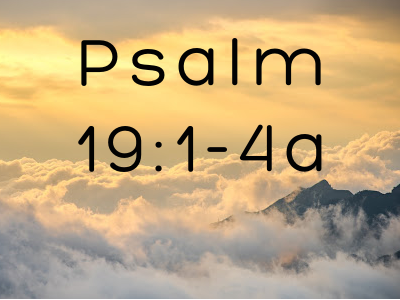Questions: Does Modern Science Prove There is no Need for a Creator?
“Mr. Griebel – you are too smart to believe in that stuff. You need to open your mind and see that there is so much more.”
I’ll never forget the day that my chemistry professor at Amarillo College uttered those words to me. Little did he know, I was already doubting my faith and his encouragement felt like it could push me over the edge. I had grown up going to a Christian high school who gave a great education but really didn’t teach much in the realm of evolution. Thus, when I started my degree and got into deeper levels of science – the knowledge of Darwin’s theory concerned me. Did God really need to exist? If life could be created naturally would the entire creation account be void? I remember pondering those questions deeply as I struggled with my relationship with God.
However, I now see as I have grown in my knowledge of not only the Creator but also of science that the entire theory of naturalism (the view that we have no need for a creator) has more holes than a slice of Swiss cheese. One problem is that life is so much more complex than Darwin and early evolutionists ever expected. Darwin himself said: “If it could be demonstrated that any complex organ existed, which could not possibly have been formed by numerous, successive, slight modifications, my theory would absolutely break down.”
Before we start talking about this we have to define a few terms that are going to be important to know. When we start discussing evolution it is important to note that evolution itself can be broken down into micro-evolution and macro-evolution. Micro-evolution is scientific fact: basically, it is the concept that life will adjust when trouble is thrown at it and thus can continue carrying on its genetics to the next generation. For example: if there is one bacteria that is immune to the antibiotic you are taking, it is going to survive and replicate compared to all the others. Macro-evolution is the theory that this can take place in a long enough time and eventually bring about all life out of a single organism. In other words: over billions of years that one cell structure eventually leads to humanity. This is the concept that a Creator does not fit into.
Alright, I know I am getting a little scientific here and many of you could care less but I want you to have a reference and a quick view of how science has come along to make this concept of macro-evolution extremely unlikely. As mentioned earlier – we see that the cell (the structure that makes up life) is much more complex than anyone realized. Each cell has an information center, replication factory, and power generator that has to be fully functioning for life to exist. Thus, if you are looking at some type of random natural reaction bringing about a functioning cell – you are statistically better off finding a single red grain of sand hidden in the entire Sahara Desert blindfolded…three times! (Stephen C. Meyer)
Here is something else interesting that I found out as I started diving into deeper levels of science – the examples of evolution they use in high school and college text books are terribly outdated. One example of this is found in an experiment that shook the United States years earlier by a scientist named Stanley Miller. He created an environment that at the time he thought was similar to the environment of early earth – put in water vapor – and heated it for about a week. To his surprise, at the end of experiment, he found that he had created amino acids – the building blocks for proteins. However, as science advanced several holes have been found in this experiment. First of all, the early earth most likely didn’t have ammonia, methane, or hydrogen which Miller used in his experiment (modern scientists instead believe it would be composted of carbon dioxide, water, and nitrogen). And when the experiment was performed again with these substances….nothing happened! Also, his experiment was in conditions that he controlled – highly unlikely to happen in a random environment without any type of input from some source of intelligent being. Lastly, even if you create one amino acid by chance – you need several of those to create proteins and about two hundred proteins with just the right function programmed into each to create life. Think about the probability of that happening…it’s astronomical. Walter Bradley PhD is quoted as saying: “When textbooks present the Miller experiment, they should be honest enough to say it was interesting historically but not terribly relevant to how life actually developed.”
Is this getting too deep? I can’t help it friends – I’m passionate about this. I will try to not carry on but I want you to know you don’t have to be ashamed of believing in a Creator. We haven’t even talked about the complexity of DNA and RNA – which has never been successfully made in a lab except under extremely rare conditions. A biochemist in Mainz, Germany named Klaus Dose admitted that the ability to make DNA and RNA is: “at present beyond our imagination.”
Nobel prize winner Sir Francis Crick said: “The origin of life appears to be almost a miracle, so many are the conditions which would have had to be satisfied to get it going.” But I can hear some of you arguing: if you have enough time anything is possible! And at one time science agreed with you – thinking that maybe the universe is infinitely old – thus giving time for “something” to happen (though as we discussed above – statistically you have a better chance of winning the lottery around ten times in a row). However, due to a concept called entropy (the universe is turning more and more into chaos instead of order) time is now of the essence. In other words, because the sun is “burning out” – we can backtrack and say that the universe at one time did not exist….something (or as we Creationist put it “Someone”) brought about a big bang to make it come into existence.
Oh, I could go on and on…and this is just from a guy that doesn’t have all the answers. We haven’t even discussed the complexity of life and what Michael Behe calls “Darwin’s Black box.” We haven’t talked about the hole in the fossil record that Darwin himself stated: “is perhaps the most obvious and serious objection” to his theory. We haven’t dived further into DNA and RNA – looking at how the code it gives has to be precise and specific to bring about life (think about seeing a written paragraph engraved in the sand and arguing the wind made that come to exists). However, I will stop myself and end this note soon as most of you may not be as interested as I am when it comes to the origin of life.
Does Christianity also have questions? Heck yes it does! However, we have the benefit of saying we have an All Powerful Creator that can answer those questions. I am truly excited that I don’t have to be ashamed of my faith or be scared to gain further knowledge of how the world works – because the more we discover the complexity of life – the more we see the need for a Creator. I would like to end this note with a quote from King David found in the book of Psalms.
“The heavens declare the glory of God, and the sky proclaims the work of His hands. Day after day they pour out speech; night after night they communicate knowledge. There is no speech; there are no words; their voice is not heard. Their message has gone out to all the earth, and their words to the ends of the inhabited world.” Psalm 19:1-4a

